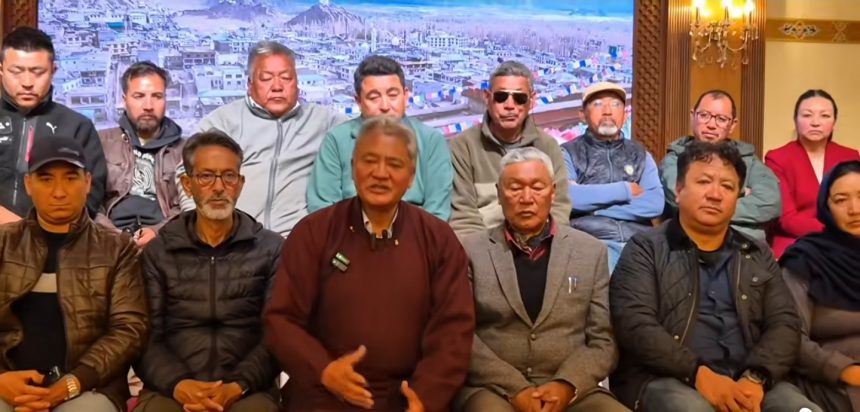Leh, April 13: In a powerful assertion of regional identity and economic self-determination, All Ladakh Trade Alliance — supported by key political parties, religious institutions and Ama Tsogspa (women’s collectives) Sunday launched a non-cooperation movement targeting 11 business properties reportedly operated by the non-local entities.
The movement, which aims to safeguard Ladakh’s fragile economy and unique cultural fabric, has garnered overwhelming support across the region, drawing rare unity among political and religious factions. The Alliance passed a resolution to safeguard the region’s identity, especially the tourism sector.
“This resolution is not about isolation—it’s about protecting our future,” said a representative of the Ladakh Tourist Trade Alliance. “Tourism in Ladakh is not just an industry, it’s a reflection of our culture, traditions and connection to the land. Letting external actors dominate it threatens local livelihoods and dilutes the authentic experience we offer to the world.”
Local traders, many of whom have been struggling to keep pace with external capital flooding into the region, voiced strong support for the campaign. Tsering Dorje, a hotel owner in Leh, said: “I started my guesthouse with personal savings and loans. Now, big investors from outside come in, buy land at inflated rates and build luxury resorts. We can’t compete with that. If this continues, local families will be priced out of their own economy.”
Rigzin Dolkar, who runs handicrafts shop in Nubra, echoed similar concerns. “Tourists come here for Ladakhi culture, not five-star clones of cities. When outsiders run the show, even the souvenirs lose their soul. We are not against visitors, but we must have a say in how our home is being developed.”
The Alliance’s resolution highlights that the unchecked influx of outside investment — through hotels, campsites, and travel agencies — is creating an imbalanced market. Local entrepreneurs, they argue, are increasingly edged out due to soaring land prices, limited access to credit and lack of government support. The Alliance has clarified that the movement is not a blanket rejection of investment. Rather, it advocates for inclusive, community-driven development that aligns with the aspirations of Ladakhi youth, respects traditional land use, and upholds environmental responsibility.
“This is a call for justice, not confrontation,” said a representative from an Ama Tsogspa in Kargil. “We want development, but not at the cost of our identity and control over our resources.”
The Alliance is also calling on the administration to revisit tourism and land-use policies to ensure that Ladakh’s economy remains rooted in local hands. Proposals include zoning restrictions, transparent land allotment processes, and capacity-building programmes for local business owners. With the summer tourist season approaching, the movement has sent a clear message– Ladakhis are ready to assert their right to shape the future of their homeland — on their own terms.








